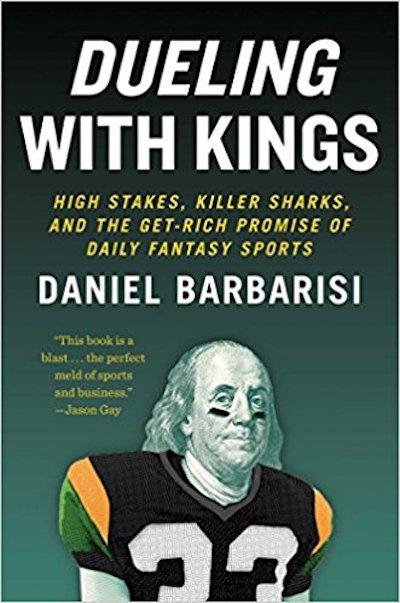During the fall of 2015, the most aggressive blitz during NFL games took place off the field. Daily fantasy sites relentlessly blistered fans with commercials that touted an easy way to win millions. The spending spree on advertising by rival sites DraftKings and FanDuel became a turning point in this cultural phenomenon. But even before the ad war erupted, author Daniel Barbarisi realized the fascinating dynamics at play in daily fantasy and had immersed himself in the story as it played out. The result is Dueling With Kings: High Stakes, Killer Sharks, and the Get-Rich Promise of Daily Fantasy Sports. Beyond the intrigue of daily fantasy, this is such an engaging read because it also explains how politics, high tech, human nature, psychology, law, math and capitalism all come into play.
ThePostGame: When you first started playing DFS, the deck was really stacked against newcomers. Since then, regulations have helped to level the playing field. What's the biggest challenge for someone getting started now?
DANIEL BARBARISI: The companies have done a decent job of leveling the playing field, to me. But the quality and knowledge level of the userbase is just so far ahead of what it was even two years ago. There are vast resources available, paid and free, for anyone who wants to improve their DFS play, and the spread of things like lineup optimizers have made it easy for even the biggest noob to have a strong lineup. Now, that's good in one way, because it means new users don't get crushed as easily. But it's also tricky, because the edge that once existed has been dulled. People ask me from time to time, "how can I find the fish?" Well, the reality is, there aren't a lot of fish left.
TPG: You went all in on this project. You quit your job as the Yankees beat reporter for the Wall Street Journal when the paper declined to give you a book leave to pursue this story. But even with the time, the focus and the tutelage from an expert at your disposal, it took many months for you to have a breakthrough. How unrealistic is it for someone to have success in DFS as a casual player?
BARBARISI: I think it's realistic for a casual player to have limited success; put in some time, win a little bit of money, stay ahead of even, hopefully enjoy yourself. But to think you're going to get rich without either getting really lucky by hitting the perfect lineup on a really big day, or putting an incredible amount of time or resources towards this, is mostly just kidding yourself.
TPG: Stats cited in the past few years peg the NFL's fan base as being more than 40 percent female. As your book documents, the percentage of women playing DFS is minuscule. How does the industry bridge the gap? Or is this not even a concern?
BARBARISI: The numbers on women playing in season long leagues significantly exceed DFS, so in theory there should be room to grow there. But the industry has always marketed and tailored itself to men only -- the bro-tastic commercials, the Playboy Mansion events, etc. It's always going to be male dominated, but they definitely could do more to try to broaden their userbase; I've seen little evidence of that to this point.
TPG: During the ad blitz in the fall of 2015, the messaging was deceptive -- "You play fantasy? Well, here's an easy way to score a million bucks!" -- yet effective. What's the best way for the industry to attract new players now?
BARBARISI: The industry should, and now does, market its product as entertainment, rather than as a get-rich-quick scheme, as they did during those earlier days. If they want to promote it as a way to spend $20, and enhance your enjoyment of the sports experience, with maybe also a chance to win something, I think that's well and good, and from what I've seen the game really does increase engagement in that manner. It's when they marketed it as easy money that I have a problem with it.
TPG: FanDuel and DraftKings reached an agreement with the NCAA last year to stop producing contests involving college sports. At the time, the two companies were up to their necks in legal and political battles, which your book covers in detail, and making this deal with the NCAA seemed to be the smart strategic decision. But money ultimately talks, so how soon will this issue get revisited?
BARBARISI: The NCAA operates on quite a different spectrum from the professional sports leagues, and has proven far more willing to keep gambling or quasi-gambling interests at arms length. I'd actually be very surprised to see NCAA DFS come back anytime soon.
TPG: The success of Daily Sports Fantasy has helped the larger push toward legalized sports gambling. But if that happens at a national level, could consumers' access to such action undercut DFS? Seems like it would be easier to just look at point spreads and pick between two teams than it would be to spend hours working with spreadsheets and crafting lineups.

BARBARISI: I'd think that nationalized sports gambling would definitely undercut DFS. While it's pretty easy to illegally bet on sports now via the Internet, there are many people -- I'm one of them, frankly -- who don't want to take that leap. If it was wholly legit, I'd think that some, not all, but some, of the DFS userbase would be siphoned away. Because to me, there are definitely people who are using it as a gambling alternative.
TPG: Your book introduces us to the top competitors beyond just their screen names, and readers get to know them more as people. For better or worse, which DFS shark/insider has had the biggest personal reaction since the book was published?
BARBARISI: I'd say that BeepImAJeep, my mentor, has had the biggest response/reaction; a lot of people in the industry knew him as a funny guy, but since the book came out some of his lines are getting randomly quoted back to him on Twitter, he's doing his own media appearances/interviews, etc., etc. Which is great to see, because he's an awesome guy and deserves every bit of attention he gets!
TPG: The merger between FanDuel and DraftKings was announced in November, but the deal hasn't been made official yet. Is this just a standard period of due diligence or might there be some sort of anti-trust hiccup that could derail this?
BARBARISI: As far as I know, there's no reason to think anything but standard review is going on. These things take time, and this was always expected to drag into the spring or summer. That said, it's not exactly a transparent process, so we have no way of knowing what's going on behind the scenes.
TPG: The beginning of Chapter 10 explains the real game within the game among sportswriters of maxing out on hotel points and airline miles, and earning elite status. What was your reaction when you heard Marriott and Starwood were merging last year?
BARBARISI: Too early to say until we really know all the details of the points transfers and how the new system will operate! Generally speaking, competition is good. Marriott and Starwood push one another, which creates opportunities for us, the consumers, in both things like rates, and loyalty programs. When one big player controls too much of the industry, then the user often suffers. Hey, waitaminute ... I wonder if that concept applies to other industries, too.
TPG: Given the personalities and quirks of the reporters, each sports beat manages to create its own vibe. Going back to your baseball writing days, what distinguishes the dynamic between the Red Sox and Yankee beats?
BARBARISI: They've both changed so much over time, with an incredible number of new faces over the time that I was on them, and then after as well. About half the Yankee beat has turned over in the time since I left, which is less than two years ago. With that kind of change, it's hard to have consistent cultures. But I found both beats really welcoming.
TPG: In the chapter that examines the issue of gambling addiction, you wrote that while you hadn't crossed the line of losing control, you had "definitely thought about DFS during sex at times (sorry, honey) ... " Please tell us that you got approval from your wife for that line before submitting to the publisher.
BARBARISI: My wife read everything before anything was submitted, and she had limited veto authority, to be sure! Just think about the stuff that DIDN'T make the cut!
-- Dueling With Kings by Daniel Barbarisi, copyright (c) 2017, is published by Touchstone. Available for purchase through Amazon, Barnes & Noble, iTunes and Google Play. Follow Daniel Barbarisi on Twitter @DanBarbarisi.






